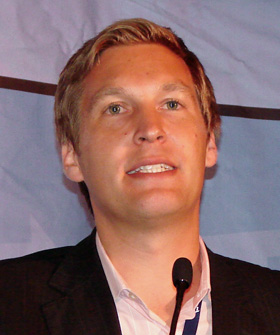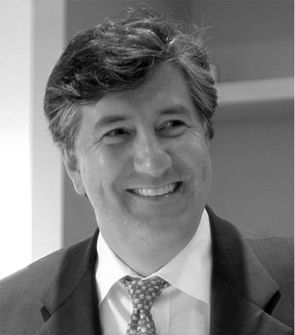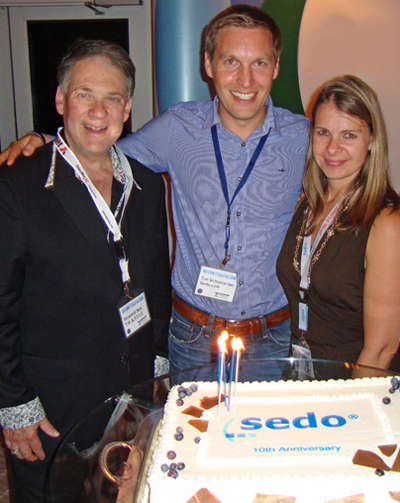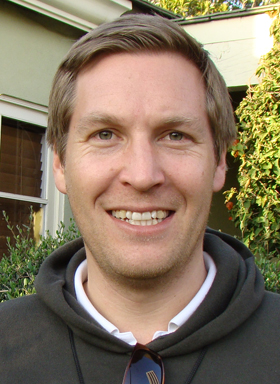|
down with him in Santa Monica,
California, where we were both attending the 2012
DOMAINfest Global conference, for a
private chat about his years at Sedo and the
company's meteoric rise over the past decade.
Schumacher would be catching a flight home to
Germany just a couple of hours later - the first leg
of a completely new chapter in his life. So we also
talked about what, after so many fruitful years in
our industry, he plans to do next.
To start at the beginning, the
first thing I wanted to know was what was it
about domain names that prompted Schumacher to
make them the topic of his master's thesis? "I
just saw a need there," Schumacher said.
"Back then we ran a web design business while
we were students to earn some extra money and we
always ran into the same problem – a customer
would say they wanted a certain name and that name
was already taken, but often not being used.
Others had names they didn’t need. We thought
“there is something wrong” between demand and
supply."
|

|
"So, we had already
gotten the idea for Sedo, we had mapped out
a business plan. We put up an early site
where you could search for names that had
been put up for sale on other sites.
We thought the biggest issue in the
domain market was going to be how to price
them and that topic would require a lot
more research. I’ve always been a guy who
tries to combine things in a more efficient
way, so for me the thesis paper was an
efficient way to get this problem solved
while allowing me to finish my studies. I
didn’t want to drop out. So, I thought I
can do this research and get credit
and hopefully come up with that magic
formula to value domains,"
Schumacher said. |
And did he find the magic
formula?
"No!",
Schumacher laughed. "I didn’t come up with
the formula – the data was all over the map. It
was really almost random. I didn’t have a
lot f data back then – if DN Journal
had existed back then I would have had a lot more
data and if Sedo already existed we would have
gotten data from there – but without sources like
that the topic had sort of haunted us for years. It
was actually just last year (2011) with the
founding of IDNX
that we really re-doubled our efforts on the
“setting the pricing” topic.
Schumacher wanted those pricing
answers from the start so Sedo could give customers
some guidelines on what they should expect to pay
for various domain names. "Right,"
Schumacher said, "so all of these factors went
into our manual appraisal system – but I
was really looking for this formula where you could
plug in a couple of factors and you get a value out.
It was much later that I learned much more about the
process, the industry, and all of these thoughts
went into it – like what makes a good domain? How
do you get names? So the paper was really more of a learning
experience for me that anything else."
| Even so, Sedo managed to make
money from the start. "We were
profitable very quickly,"
Schumacher confirmed. "Largely due to
our appraisal product which was our
most important product. That’s where my
masters thesis really helped. Doing the
appraisal was a manual process.
I did most of the appraisals the
first two years myself but I had
developed a nice template system and it was
a unique product, especially in Europe.
It was something people wanted to know –
their first question was “what is my
domain worth?” We answered that
question and charged around $9 to $19,
depending on the
type of appraisal. We had very little
overhead – little salaries – so we were
profitable very quickly. After the first 18
month we had about 10 people but many of
them were interns or apprenticeships.
All of the founders were working on
the company in different roles though."
While Sedo grew more and more profitable
in |

Image: Stuart
Miles / FreeDigitalPhotos.net |
| the years ahead -
one thing remained the same - finding an appropriate
domain name can still be a difficult
process. "There are still entrepreneurs
starting up new companies and they run into
a naming issue every time,"
Schumacher concurred. "With all of that
effort in pricing names, making the
information accessible, fast transfers, it
is still only applied to a small sub-set
of names – so it is still a pretty
imperfect market." |
When you look at how people
find names, there are really only three sources. One
is if you know Sedo or one of the other marketplaces
you go to them – that is what the professionals
do, but Sedo is not a household name so we
needed to be in the purchase flow of the
second source – the registrars – and that
is why we are so excited about the GoDaddy
announcement (made at DOMAINFest Global
2012) because that is really a huge step. The
third source is parking – that is why we
tell people parking and selling need to be closely
linked together and we need to make sure that
someone who types in a name they are interested in
and lands on a parking page, knows the name is
for sale," Schumacher said.
"Finding a name is a creative
exercise," Schumacher noted. "Somebody
says something and then you say, “let’s check
and see if that name is taken”. That is when the purchasing
decision is made. If that name is seemingly
unavailable, you just cross it off the list, unless
it is a name you absolutely want to have. But if you
land on a page, or are searching through Sedo and
you see a name is available for $1,000, you say
“Perfect – then it’s an option – it makes it
on the short list and that’s how naming decisions
are made in the
majority of cases."
| Though domain pricing is still
an arcane process, Sedo's sales platform has
evolved considerably over the years.
"The first site was very
basic," Schumacher recalled. "I
actually programmed parts of it myself –
the html stuff.
Uli (Priesner), the partner
who served as CTO, coded the
difficult stuff – the data base stuff.
Essentially it was only a search platform
– and that’s where the name “Sedo”
comes from - Search Engine for Domains.
Back then
we searched GreatDomains (a company
Sedo later acquired), we searched Afternic
(owned by Register.com back
then), we searched
tons of other places – most of
which aren’t even around anymore - so
basically we became an aggregator of
all of those other sources so people could search
in one place."
"We could make a little money
through their affiliate programs but we
quickly realized that wasn’t going to let
us go any further because when searchers
went over to GreatDomains they had a
completely different purchasing flow than
Afternic and others had different ones as
well. So, we quickly decided we had to put
that side of the equation on our side
and let people place names for sale on our
platform and provide real value to domain
sellers," Schumacher said. |

Sedo
Co-Founder and CTO Uli Priesner |
Once they had their own sale
platform, the next task for Sedo was to let people
know the new option existed. Even that was more of a
challenge back then because the industry did not
have the many dedicated media options that it has
today.
"That is one thing that
has really changed." Schumacher agreed.
"Back then the whole social networking thing
did not exist, there was no Google Adsense
and DN Journal didn't come along until
2003, so a lot of it was guerrilla marketing.
We emailed people that owned domains, posted in
forums, told the mainstream press what we did and
got coverage by doing studies rather than
just putting out a press release – for example,
breaking down how many domains were not being used,
how hard it was to find a name, etc. You need to provide
value to the press to get quoted."
Sedo also had to overcome a
naming issue of their own. When the company decided
to set up an office in the U.S. they had to
do it on Sedo.us because they did not own the
.com (as a German company, they started on Sedo.de).
Getting Sedo.com turned out to be a real negotiating
ordeal. "It took four years!,"
Schumacher recalled ruefully. "We
finally got it for $80,000. It was a lot of
money, but it was still a very good investment. It
is still a lot of money for a four-letter .com that
means nothing but it was a fair deal. Before we got
it we seriously considered re-branding
because we knew we couldn’t go into the U.S.
market with Sedo.de."
|

Tim
Schumacher in 2007 |
With that problem
solved, and the established of offices in
key territories, Sedo really started hitting
its stride. After starting with approximately
20,000 domain listings their platform
has more than 15 milliion today and
Shumacher expects that number to grow
exponentially. "At 15 million it is
still small," he declared. "The
total number of domains registered just
passed the 200 million mark and we
all know a lot more than 15 million
registered domains are not currently being
used, so I think there is a lot of
room for growth."
Speaking of growth -
Sedo's business went through the roof not
long after they opened their U.S. office in Boston
in 2005. "Parking was exploding
and as a result domain prices also started exploding,
so those were the golden years, 2006
and especially 2007," Schumacher said.
"Private equity were showing up at all
of the shows. A lot of our competitors got
major funding but we have always been
profitable and always grew our business organically.
Yet, with some of the companies |
| getting $50-100
million in funding we thought, “They
are just going to kill us”
but it didn’t turn out that way. We
did invest $10 million or so buying
new portfolios, etc. and those were bad
investments but not as bad as some of the
others were making." |
"There was actually over
investment," Schumacher continued. "I
think we were a bit more sophisticated than some of
the new players who rushed in and thought that is
going to be a great market and didn’t see the
pitfalls. They came from the outside, the
financing world or whatever, and thought they were
going to conquer the world. In retrospect I
learned that whenever you invest make sure there is
at least one person who really understands
the business. Having a good finance person is a
great counterpart but you can’t just have three
MBA guys running a business who really don’t know
what’s what. Even if they had some knowledgeable
people below they may not have been listening and
that’s what happened in many of those cases – people
just got greedy. They thought if I pump in $100
million I’ll make 10 times more money than if I
pump in $10 million."
|

NameMedia
CEO Kelly Conlin
A competitor Schumacher admired |
Things really started
going south when practically the entire
world went into a severe recession in
2008. The carnage was widespread, but Sedo
managed to weather the storm. "We had
to switch gears and it took us a little
longer than most of our competitors,"
Schumacher said. "Take NameMedia
for example. Kelly Conlin (NameMedia's
CEO) - a guy I really respect who is a brilliant
leader – had been through that before and
I think he shifted gears very quickly.
They did some painful cuts early on to get
themselves right and executed them early on.
For us it was a totally new
situation. We had 7-8 years that had just
been up, up, up so we really did not
make any painful cuts until around the
summer of 2009, later than probably any of
our competitors."
"We also did it a
lot more moderately – about 15% of
the workforce -
so it probably hurt us in terms of
cash flow but it did help in terms of
retaining some people and retaining
knowledge. It was probably a good thing
to have to do because we had just become too
big and too used to growth and so I think
we |
| used this to
re-align strengths in some areas as well. It
was a learning experience. Since then we
have been pretty much stable but it changed
the mood and emphasized that profitability
is just as important as growth and that
we have to work harder for every dollar than
we did back then," Schumacher said. |
"In 2006 we sold about 20%
of the company and that turned out to be good timing
– a little too early maybe, perfect timing would
have been 2007 – but it was OK for our investors
as those proceeds all went to them, not into the
company as it never had a cash flow issue. In
2008-09 profitability dropped but we never lost
money. In 2009 we swapped the remaining shares into
the public company (Sedo Holdings AG). It was
a complicated transaction but it worked out well. We
have two business lines that are very profitable Sedo
and Affilinet – Europe’s largest
affiliate network, and we have cash in the bank.
We never did a fancy IPO which would have
been kind of fun too with a lot of press and
attention but we just did it kind of quietly and we
are in a good position now.
| One area where Sedo has been
especially dominant is ccTLDs. As a
look at our weekly
sales charts on any given
week will show you, they essentially own
the resale market for country code domains.
"With respect to our success with
ccTLDs, the various markets actually work in
similar ways," Schumacher said.
"Of course, every TLD has their own
regulations, but regulations are just a process
issue. You determine what is the process for
transferring that name – that needs to be
done right - but it’s not changing the
business model so we have just been growing
the business model all over the world.
Almost every successful Internet business
works that way and sees that there is really
very little difference around the world. We
have a very international staff so we
have people who speak the various languages.
That is something we did early on an
basically just repeated it in other
countries." |

|
Having helped navigate the
company through the worst of the recession and back
into a position poised for renewed growth,
Schumacher decided it was the perfect time for
him to take a well deserved family break,
then explore some new investment opportunities that
he is excited about. Still, leaving his his daily
duties at Sedo leaves him with mixed feelings.
"It will probably really
hit me once I am out of the office," Schumacher
said. I have been working together with new CEO
Tobias Flaitz, handing things over, introducing him
to people, giving him background on a lot of things
and preparing information so he can hit the ground
running, so I really haven’t had time to reflect
and that will probably come when I am out of the
office. It’s sad because there are a ton of people
I will probably not see for at least a good while
and a lot of good things I leave behind. But at the
same time I am looking forward to having some free
time and thinking about completely new things
and having the luxury of time to do that."
"So, it’s a mixed bag,
but overall I am positive – I think the company is
in good hands with a fabulous team –
I am really proud of the team we have. All of the
other co-founders are on board as well. One of them,
CTO Ulrich Priesner is currently on a sabbatical
traveling the world but he will return in a couple
of months. He always had a very important role with
the company, a very sharp guy who was instrumental
in Sedo’s growth and he will work well with
Tobias. That gives me a good feeling. I made the
decision to leave earlier in 2011, so it
has been almost a year in planning and a
great team will remain in place."
With the freedom to go in any
direction now - what is in store next for
Schumacher?
|

Tim
Schumacher (center) sharing a Sedo
10th
Anniversary cake with T.R.A.F.F.I.C.
Co-Founder
Howard Neu and Sedo Strategic Alliances
Director
Kathy Nielsen at the 2011 T.R.A.F.F.I.C.
conference
at Fort Lauderdale Beach, Florida (October
2011). |
"First, some travel
with my family including a trip to New
Zealand," Schumacher said. "I
also have a couple of projects I am involved
in, mostly in the online space but not
in the domain space. I will still be a
shareholder in Sedo and be on the board so I
don’t want to create a conflict of interest
that could arise if I got involved in
something in the domain space so that is one
reason I will get involved in another sector.
As much as I love the domain space, I also
want to explore some other areas. Over the
next ten years domains will continue to be
important though. You’re still going to
need a domain
ten years from now."
"I might get
involved in something like online advertising
or spend more time on a new project like enbreeze
that I am working with. They make small wind
turbines that generate energy for private
homes. First, I’m giving myself a couple of
months to relax. I don’t want to jump
right into the next thing, but after that I
expect to get really involved in something
new, "Schumacher said.
"I’ll have some
investments too but simply investing in a |
| project doesn’t
fulfill you in the same way as having
control of a project and building
something yourself does. I love the
investments I have supporting a lot of
bright entrepreneurs. I get a lot of ideas
from them and some are younger and are much
better with social media or SEO and other
topics I can learn, so it’s a very mutual
exchange, but it’s their company
–and it has to be - so if I started to get
too involved they would probably be like hey
that’s not what we wanted you for!,"
Schumacher laughed. |
Schumacher has
been such a large part of the domain industry that
not having him around will feel very strange to us.
Though we will certainly miss him, we wish him all
the best as he goes off to explore new opportunities
in the business world. Many chapters remain to be
written in the Tim Schumacher story and I'm
sure they will be just as interesting as those we
have read over the past ten years. I am looking
forward to that. |













